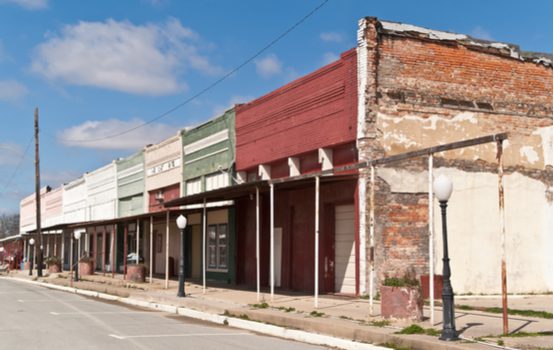How Environmentalists Destroyed Small Towns

Three years ago I watched a PBS documentary about the high school basketball team in tiny Medora, Indiana.
The team had not won a game in several seasons and lost most by wide margins. The producers followed the team until it finally won one.
While most viewers may have regarded this as simply a fascinating sports documentary, what concerned me then (and now) was the root cause of the decline of this team and the town it represented.
The program had flashbacks to the ‘50s and ‘60s when the town was prosperous and the high school had many more students.
Then the two biggest employers—a brick factory and a plastic factory—closed. The area’s small farms and small businesses struggled and many went under or barely got by.
When I was growing up I was a batboy for the Knoxville Smokies baseball team and got to travel all over the southeast.
My mother was from Iowa, but four of the seven children in her family moved south. My father was from Tennessee, but five of the ten children in his family moved north. I ended up with aunts, uncles, and cousins all over the country.
This was mostly before the days of the interstates and I rode buses all over the country for the Smokies or to visit relatives. Almost every small town in the South and Midwest that I traveled through had two or three factories and many small businesses.
Then, as commentators as diverse as Pat Buchanan and Ed Schultz have noted, more than 50,000 factories closed over the years.
This is why President Trump in his statement about the Paris Accords talked about “lost jobs, lower wages, shuttered factories, and vastly diminished economic production.”
This not only happened in Medora, but also in small towns all over the country.
Most of the businesses that closed were small or medium-sized businesses that were killed in large part due to environmental regulations and/or foreign competition, both of which the president mentioned in his Paris statement.
We have raised more than a generation of young, and even some middle-aged people, who were brainwashed into believing that every time they heard the word environmental it was unquestionably good.
And we have many environmental groups, often funded by foreign energy producers, that refuse to acknowledge great improvements in our water and air because their contributions will go down if they can’t keep convincing people that everything is bad and getting worse.
But closing thousands of factories did not just destroy jobs for factory workers. It destroyed many management and white collar jobs as well.
When I graduated from the University of Tennessee in 1969, it was easy to find good jobs with just a Bachelor’s degree.
Then federal and state environmental rules and regulations made it much harder for small factories, farms, and businesses to survive.
Almost every college student felt they had to go to some sort of graduate school and far too many went to law school.
We ended up with the best educated waiters and waitresses in the world and a whole generation saddled with student loan debts (1.4 trillion outstanding) that they can’t repay.
Closed businesses and lost jobs go hand-in-hand with higher rates of drug addiction, broken homes, and poorer health. It also leads to a declining population because young people are forced to leave to find work.
President Trump is being attacked on all fronts. Unfortunately, most people will not read his statement on the Paris Accords. If they would, the overwhelming majority would agree with it.
Instead, they will read or hear the incessant, hysterical, attacks by the media, environmental radicals, and the far left.
As the president said, the Paris agreement allows China, India, and even Europe, to expand coal production while “we’re supposed to get rid of ours”.
He added: “This agreement is less about the climate and more about other countries gaining a financial advantage over the United States” and transferring billions from the U.S. to poorer countries.
China certainly follows a China-first policy in every way, as do most other countries. It is far past a time when we should have been doing the same.
The president’s policies on the environment and federal regulations have been strongly opposed by big corporations, both here and abroad, that make money off big government, environmental over-regulation, and the competition it eliminates.
Even though I have followed political wars closely for over 50 years, I am astounded by the hatred those on the left feel about this president.
President Trump has certainly proven that he is not the smoothest politician around, and he has said and done some things that even his strongest supporters have wished he hadn’t.
But his heart seems to be in the right place, with middle and lower income working people.
And his policies give at least some hope that the decline in Medora and other small towns can be halted.
John Duncan is the U.S. Representative for Tennessee’s 2nd congressional district
Comments